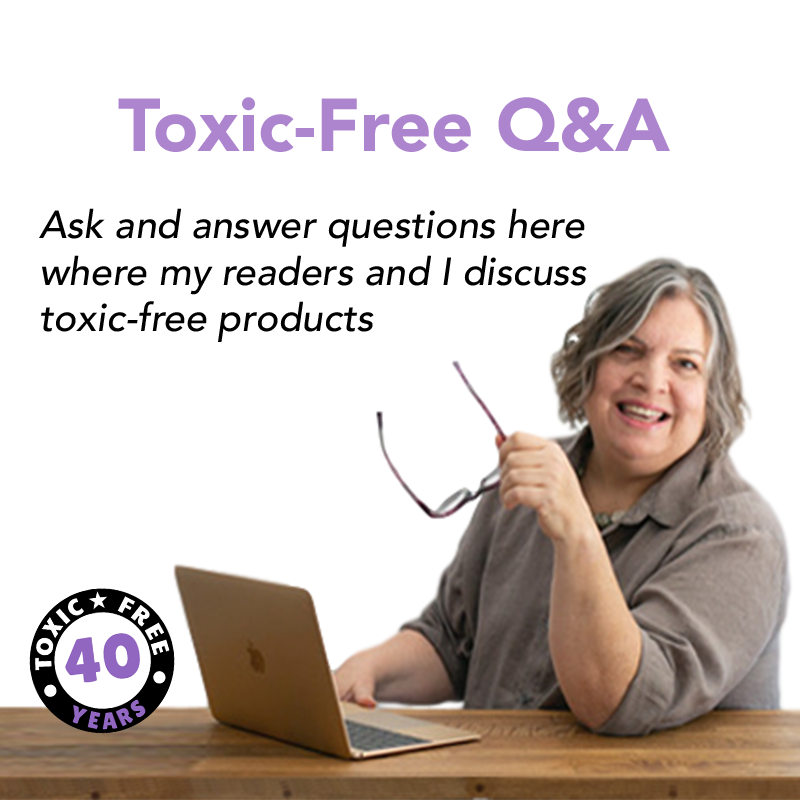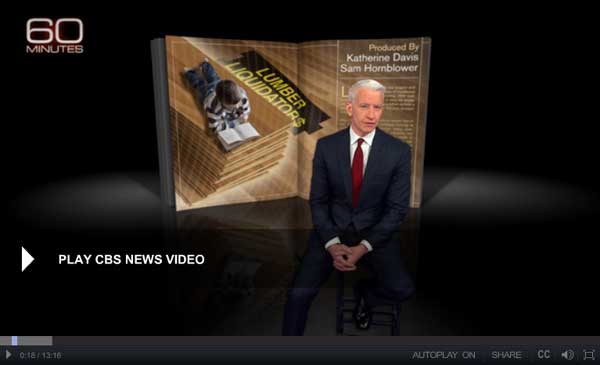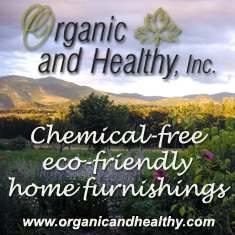
Submitted questions will be posted with my response by the following Tuesday or before.
Submitted comments will be moderated and approved within 24 hours.
What are Toxic Free Tableware and Glasses and Earthenware?
Question from Joyce Kerkhoff
Hi Debra,
I am glad I found this site.
I am trying to make my home and that of my family as toxic free as possible.
I have recently bought glasses made by Libby; and table ware made by oneida, and have bought knives made by Henckles. Also earthen ware made in China exclusively for Williams-Sonoma.
The plates have colores of orange, green, yellow and background of white. I try to find out about the glazes used and the level of possible iron and cadium. I do not find this information.
I recently rid myself of inherited glassware from my grandmothers used back in 1940’s. and 1950’s. Was also gievn pewter steins made in Germany back in 1992.
Would appreciate your help.
Debra’s Answer
I wish I could give you information about all these items, but I don’t have it either.
I have never had any experience with knives being a problem.
I assume clear glassware to not be toxic, based on the ingredients used to make glass.
As for the ceramicware, get some Lead Check Swabs. If it tests positive it’s for sure toxic, if it tests negative, there’s probably no lead but we don’t know about other metals. I use clear glass dinnerware and ceramic pieces that I have tested safe with LeadCheck swabs.
I need to get some dinnerware manufacturer to test their dinnerware so we know it’s safe…
Living Near Golf Course
Question from Jonathan
Hi Debra,
I found your site to be a wonderful source of information, and was hoping you might be able to help me with a question or two.
I am considering buying a country home, in Upstate New York. It is across the street from a golf course. (Given the acreage of the property, it’s reasonably far away.) There is also a gas station a few thousand feet away. I know that both of these are concerns, but how great a concern are they? I have three young children, and the entire point of the country home is to give them a place to play outside. Is that safe?
Thanks so much.
Debra’s Answer
Distance really is the deciding factor. I wouldn’t buy a house bordering on a golf course or next door to a gas station, but a few thousand feet away should be sufficient.
I would just check the prevailing winds. If they are blowing in your direction, you’ll get fumes from these sources.
Also I would check what pesticides are used to maintain the golf course. Many golf courses have switched to less toxic maintenance. If your golf course isn’t already with the program, you might suggest they look into it. Just search the interest for “IPM golf courses” and many websites will come up. IPM is Integrated Pest Management, a program that greatly reduces pesticides if not eliminates them altogether.
Blocking /sealing Disintegrating Foam in Van Ceiling & Auto Air Filter
Question from Patricia Thomson
Hi Debra,
I recently was given a different vehicle to drive at work a 2005 Chevrolet Express Van. There is a disintegrating layer of foam on the ceiling of the front seat covered by a thin layer of cloth. The cloth had departed from the ceiling so there was foam dust falling into the dashboard. I taped up the cloth to the ceiling using duct tape and covered any exposed foam with duct tape and cleaned the vehicle. Is there anything else I can do to seal off the ceiling. It’s a work vehicle – I don’t have a choice in the vehicle I use but would like to be safe while driving it. I also thought about getting a good quality auto air filter. Has anyone had experience with one that was good?
Debra’s Answer
If I really want to block fumes I use heavy duty aluminum foil or foil-backed building paper if I need extra strength. I tape around the edges with foil tape. This works without fail. Not pretty, but it blocks and you can put something better looking over it if you want.
In the past I had an auto air filter by E. L. Foust. It worked very well. You just plug it in to the cigarette lighter.
Wire Shelving for Closet
Question from Nancy Carew
Hi Debra,
We are building a new house and I have multiple chemical sensitivities. I have a question about closet shelving. I believe you suggested wire shelving to someone else who wrote in. I read about Rubbermaid wire shelving and it says it is recycled steel with an iron phosphate coating and the finish coat covered with an epoxy-polyester powder coating. Closetmaid uses PVC coated steel. Would you feel the Rubbermaid is a safe choice? Thanks.
Debra’s Answer
Yes, you figured that out exactly right.
The epoxy-polyester powder coating is baked on and makes a “hard” finish that doesn’t outgas.
The PVC coating is a “soft” finish that outgasses.
BTW, all steel nowadays contains at least some recycled content whether noted on the label or not.
What to Ask When a Label Says “Made in USA”
One way to find products that contain fewer toxic chemicals is to look for products “Made in USA.” While some foreign products can be less toxic than those made in the USA (particularly some products from Europe and especially from Germany), many many products on USA store shelves com from foreign countries that do not have laws that restrict the use of toxic chemicals.
While most organizations that support “Made in USA” products feel that manufacture of the product by USA labor in a facility in the USA is sufficient to warrant a Made in USA claim, federal and state regulations that apply to claims that products are “Made in USA” don’t agree.
The Federal Trade Commission (FTC) has a Made in USA standard that applies if a product makes a “Made in USA” claim. According to the FTC, “Made in USA” means “all or virtually all” the product has been made in America. That is, all significant parts, processing, and labor that go into the product must be of U.S. origin. Products should not contain any – or should contain only negligible – foreign content.” (http://www.ftc.gov/tips-advice/business-center/complying-made-usa-standard)
The State of California agrees, requiring that every component of a product be made in the USA.
California law prohibits the sale or offer for sale of any merchandise that is labeled “Made in the USA” or similar words “when the merchandise or any article, unit, or part thereof, has been entirely or substantially made, manufactured, or produced outside of the United States.” (http://leginfo.legislature.ca.gov/faces/codes_displaySection.xhtml?lawCode=BPC§ionNum=17533.7.)
There is value in purchasing “Made in USA” products that refer only to USA labor and business ownership. This keeps our dollars in the US economy. But USA laborers can very easily assemble toxic materials from other countries. If you are wanting, for example, to avoid products made in China, a “Made in USA” label would be misleading and inaccurate if the materials being used came from China.
I’m in agreement with the Federal and California state law. To me, Made in USA means that the raw materials are sourced in the USA, and processed and assembled in the USA. From beginning to end.
If you are looking for “Made in the USA” products, it’s important to ask if the claim refers to labor, or labor and materials. Manufacturers should know the country of origin of their materials, as well as the source of raw materials and any processing done to them. They should know, but often don’t.
Just be careful when you see “Made in USA” and make sure the materials come from the USA as well as the labor.
Saatva Mattress
Question from Jamie Smith
Hi Debra,
I am looking for an organic mattress. I have never heard of this brand but it claims to be organic. From what you know, does this seem legit?
Thank you so much for all you do!!
http://www.saatvamattress.com/saatva-mattress.html
Debra’s Answer
There is a very specific definition of organic mattress. The only mattresses I know of that qualifies for this definition—established by the Organic Trade Association and the Global Organic Textile Standard—is Naturepedic. They now make adult mattresses as well as crib mattresses.
Saatva is not an organic mattress.
The cover is made from organic cotton.
The foam is “bio-based”. My understanding of bio-based is that it is basically polyurethane foam with a little vegetable oil added. It still would be flammable and require some kind of fire retardant, which is not mentioned.
The coils are made from recycled steel. That doesn’t make it organic, and all steel coils are now made from recycled steel. Virtually all steel in every consumer product is now is made with some, if not all, recycled content.
See Debra’s List: Beds & Bedding for more mattress choices.
Car Seat Cushions Toxic Free
Question from Beth Kant
Hi Debra,
Cannot find car seat cushions to sit on that are organic and toxic free any help finding or making what materials to use. Help.
Debra’s Answer
Well, I found one online pretty easily: 100% Natural Latex Seat cushion with Organic Cotton Covering
But that was the only one I could find.
If you don’t want latex…If I were going to make one I would get a sleep pillow filled with something I like (I like wool, but kapok or other fillings are fine), fold it in half and put it in a pillow case. Wrap the pillow case around and pin it if needed with safety pins. That’s actually what I did to make a seat cushion for my desk chair and it works great.
Experiences with LED Lighting Ballasts and Sound
Question from Angelique
Hi Debra,
Does anyone have any experience, good or bad, with LED lighting ballasts and sounds? We are remodeling our kitchen and replacing the old fluorescent lighting ballasts. We thought of switching to LED lighting. My husband brought home an LED shop light ballast to try. The amount of light is fine, but when he turns it on, I feel like someone is stabbing me in the ear, as well as head pressure. I cannot HEAR anything; I don’t hear any buzzing or high-pitched whine. (And I head high-pitched whines ALL the time.) But I must be picking up SOMETHING. Any insights?
Debra’s Answer
Readers?
Home Security Systems
Question from TA
Hi Debra,
Hi Debra, I’m wondering if you have any advice about home security. I’ve wanted to avoid the wireless systems (though we do have wireless internet which I turn off at night, though I’d like an alternative to the wireless during the day as well). There are security cameras that are DIY installations, but those are typically wireless also, I think. And security systems that use the phone lines aren’t recommended, since the phone lines can be cut.
I recently saw a recommendation for this company which provides home security systems that use a cellular signal, and I’m wondering if this would be a reasonably safe option. I think the important questions to ask the company would be whether there is any constant transmission, or whether it transmits only in case of emergency (when the alarm is set off and notifies the security company and police, etc). It seems to me that could be reasonable, since we do have cell phones but I don’t wear it on my body or keep it beside my bed, etc. Here is the company site: http://smiththompson.com/how-it-works/
(It states “wireless” – but my understanding is that this cellular signal is a different type of monitoring than other wireless systems.)
Do you have any thoughts about what they are saying? Any suggestions for questions I should ask about this (or any other) security system? Any other alternatives for home security?
Debra’s Answer
I am not an EMF expert, but am posting this so anyone who does have a good answer can reply.
Thanks.
60 Minutes Finds Formaldehyde in Lumber Liquidators’ Laminate Flooring
I’ve been writing about not using laminate flooring for years. Now 60 Minutes has verified that laminate flooring contains amounts of toxic formaldehyde that may not meet health and safety standards.








